Note that some of the travel below may have happened during the Summer 2019 term but completed in Fall 2019.
Australia
Sacha Cavelier
Biomedical Engineering
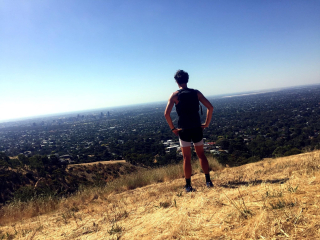
GMA experience in Australia
"Thanks to the GMA, I was able to do a 3 months internship at the University of Adelaide in Australia. I have worked in a cutting edge environment and experienced the very high research standards that Australia developed in the last years in biomedical engineering. I collaborated with Flinders University and compared the mechanical response of pericranium and dura with the hope to develop autologous dural implants in the years to come. This experience was crucial in my CV to get a postdoc, as this kind of position is very competitive. In addition to academic research, the Australian lifestyle is very attractive. Public transportation (train, bus, boat, tramway, o-bahn) is very developed and free or very affordable, which makes possible to lunch with koalas in the surrounding mountains before spending the rest of the day at the beach 50 km from there."
Canada
Jonas Regnier
Music Composition
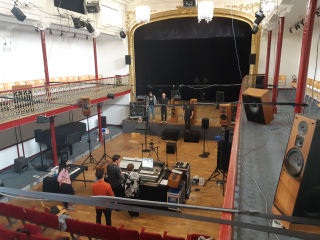
The Concert Hall in Brussels in which we played our compositions contained 80 loudspeakers spread around the public
"This Composition academy contained numerous workshops, lectures (4 hours per day), and masterclasses with well-known composers coming from the US (Harvard University), Belgium, and Portugal (Lisbon University). As a participant to this academy, I had the opportunity to work on an newly composed electroacoustic composition of mine with 4 of these internationally acclaimed composers and teachers. The lectures and workshops organized during this academy made me gain a lot of knowledge, new perspectives and experiences that I can use for my future professional career both in academia and for my personal compositions.
This was also a great opportunity for me to meet wonderful and inspiring international composers and have meaningful conversations about our different ways of thinking about music and composition.
I am very grateful to have received the Graduate Mobility Award, without which none of the above would have been possible!"
Liam Fitzpatrick
Bioresource Engineering
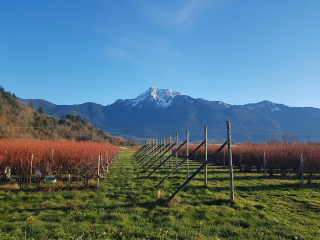
Visiting the Agassiz research site to inspect their sampling set-up (as well as some spectacular views!)
"The award allowed me to visit the Biometeorology and Soil Physics Group at the University of British Columbia, specifically working with their Research Engineer, Zoran Nesic. My two week stay was incredibly productive. During the first week I was introduced to the lab's members..., visited their research site at the Agriculture Canada Research and Development Centre in Agassiz, and presented results to a group of interested professors and students involved with similar soil greenhouse gas fIux research...
Overall, I learned a lot about what it takes to design and run a soil gas flux sampling system and was able to improve many of the technical skills necessary for doing so. I was able to receive instruction on designing and prototyping a new method for receiving feedback from automated chambers on the status of lid closure. At the Agassiz site, I was able to see how they operated their instruments in the field, and came away with many observations which could be beneficial to our own operations (the mountain views at their site were incredible too!). I had the opportunity to solicit feedback on the set-up and results of our experiment from some of the foremost experts in the field. And I was walked through their data handling process and will be able to apply what I learned to our system to improve its robustness and efficiency."
Hadi Husaini
Bioresource Engineering

Crop modeling meeting with 3 physical physical scientist at Agriculture Agri-Food Canada
"I worked with a couple of agriculture-Agrifood Canada research scientists who have worked on computer-based crop modelling for more than 20 years. I had great meetings with them and ask my questions related to my Ph.D. topic. I will be using their database to set up the models and run different scenarios. I will investigate management strategies that are targeted for increasing yields and reducing nutrient losses across a wide range of cropping systems for 30 years of climate variability. I will assess management practices that are currently being investigated at the research sites along with promising new management practices relevant to each location. As the last step, I will extend the assessment to evaluate the resilience of various agricultural cropping systems under climate change until 2100."
Jui-Sheng Li
Music Performance
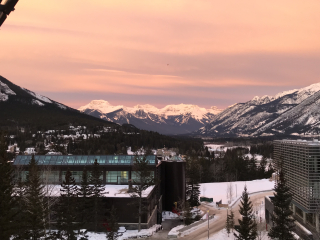
A picture taken outside the Vistas restaurant of the Banff Centre for Arts and Creativity
"At the Banff Centre for Arts and Creativity, I was extremely thankful that I was able to fully concentrate on carrying out the proposed project "Masked Music" itself, even though it is still at the preliminary stage of the research. During my five-week residency, a wonderful chance I had was to be acquainted with artists across disciplines (i.e. performing arts, visual arts, indigenous arts, literary arts, etc.). In addition, I had a valuable opportunity to facilitate a self-curated cross-genre concert "Heartbreak and Redemption" with a wonderful Toronto based Songwriter and Bassist, Carlie Howell. Curating the aforementioned concert, the idea came in an afternoon discussion, 'what is the main mission of an artist? why do we pursue in music as our career?' We, both agreed, that everyone in the society has their own means to vent their emotional feelings, and we both found that making music allows us to musically voice our inner turmoils in many positive ways. As artists, we envision ourselves to continue bringing the music we adore to the communities wherever we go. Thanks to the generous support of the Graduate Mobility Award, this trip would not be possible otherwise."
Jeffrey McCrossin
Social Work
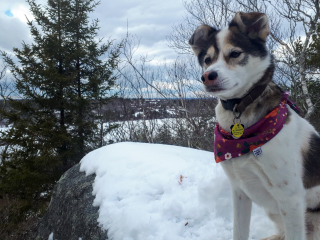
My old pal
"It has been a few years since I moved my life from Nova Scotia to Montreal to be a full-time McGillian, first completing a Master’s in Applied Science in Couple and Family Therapy (2019) and now working on my PhD in Social Work. Naturally, when my supervisor Dr. Lucyna Lach (McGill University, Child Neurodisability Group) told me about her collaboration with the Nova Scotia-based Strongest Families Institute, I had to jump on board. The week-long trip was full of opportunities that have made a lasting impact on my studies, from sourcing several potential data sets for my thesis (Strongest Families Institute and the IWK Health Centre), to solidifying a mentorship relationship with a world-leading expert in child, family, and community resilience (Dr. Michael Ungar, Dalhousie University). I even had the chance to reconnect with an old pal. Thank you, McGill!"
Colombia
Alexandre Demers-Potvin
Biology
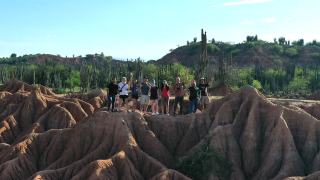
The Colombia 2019 Redpath Museum field crew with Fredy Parra Ruge (CIP) posing in the Tatacoa desert in the early morning.
"In December 2019, I undertook field and museum work in Colombia along with Dr. Hans Larsson, seven other McGill students, and ichthyosaur expert Erin Maxwell (Stuttgart Museum of Natural History). Our general aim was to strengthen a collaboration between the Redpath Museum and the Centro de Investigaciones Paleontológicas (CIP), a fossil museum located in Villa de Leyva, in the Andes north of Bogotá... In between occasional fossil prospecting trips in the countryside surrounding Villa de Leyva, I began a review of the CIP's Cretaceous plants preserved in these marine sediments after being washed out to sea. I also practiced a surface scanning technique with a portable scanner acquired by our lab just before the trip, notably rendering 3D illustrations of some of the conifer cones I studied. Later, I participated in descriptions of new marine reptile species initiated during our stay, including a large-headed plesiosaur represented by an exquisitely preserved skull.
After our two-week stay in Villa de Leyva, we traveled to another museum located in the village of La Victoria, in the Tatacoa desert south of Bogotá. This region contains one of the latest records of a South American fauna prior to the formation of the Isthmus of Panama, when this continent was still dominated by marsupials, xenarthrans and notoungulates. In this museum, I contributed to scanning the surface of an almost complete 'sabre-toothed marsupial' skull. Later, in the field, I helped local palaeontologists collect skull fragments that could belong to a similar animal, thus significantly expanding this museum's fossil marsupial record.
Throughout my stay, I have been amazed at the diversity of landscapes and wildlife we encountered, from the alpine meadows in the mountains near Villa de Leyva to the mosaic of savanna, semi-desert and dry tropical forest in the Magdalena river valley. I also greatly appreciated the welcome we received from the people who hosted us wherever we went. The initiation of international collaborations in such a wonderful country with such a high potential for future discoveries is one of the most fulfilling scientific and cultural experiences I have had since I arrived at McGill."
Hoainam Bui
Biology

CIP and McGill researchers creating a 3D surface model of a fossil specimen in the fossil preparation lab in the museum.
"I accompanied my lab to Villa de Leyva, Colombia for two weeks to collaborate with scientists and conduct paleontological collections work. We were given the opportunity to work within the Centro de Investigaciones Paleontologicas alongside local scientists, technicians and preparators, as well as local high school student volunteers. Using a 3D surface scanner, we were able to collect surface data with high resolution to create the beginning of a 3D collections database. Collaborative projects also surfaced between scientists in the museum and the students of McGill (e.g. re-descriptions of pliosaur fossils, descriptions of an elasmosaur skull, and investigations of different evolutionary themes through anatomy). The lab as a whole gained experience in science outreach by giving a public presentation in Spanish, creating new connections with international scientists, as well as training into a new scientific tool for imaging and data analysis."
Anthony Smith
Biology
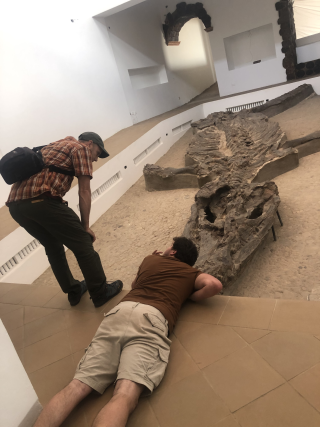
Myself (Right) and supervisor Dr. Hans Larsson (Left) looking at the skeleton of Kronosaurus boyacensis
"I’m very grateful for Graduate Mobility Award which allowed me the opportunity to travel to Colombia and work with the unique collections at the Centro de Investigaciones Paleontologicas (CIP) in Villa de Leyva. I was able to 3D scan the limbs of three different marine mesozoic reptiles as well as a host of other fossils for both mine and other projects. I will be using these specimens for a systems biology analysis of limb development in these animals which can be used to better understand the evolution of the tetrapod limb as a whole. Through this experience I was able to cultivate new relationships and collaborations in Colombia and experience a new culture."
France
Hyeree Park
Mining and Materials Engineering
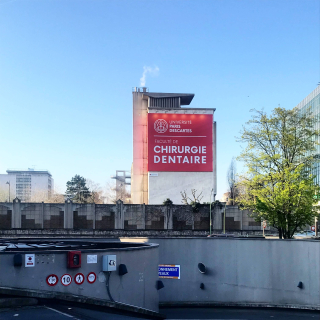
University Paris Descartes Faculty of Dental Surgery
"My research is within an interdisciplinary field of tissue engineering, specifically for bone tissue engineering. This collaboration University Paris Descartes in the Faculty of dental surgery allowed me to further my research by facilitating in vivo investigation and analysis. Coming from an engineering background, working in this environment gave me access to not only different techniques and equipment but also expanded my thinking about the subject. I am grateful for the opportunity for this and excited about the continuation of the collaboration!"
You Chou
Integrated Program in Neuroscience
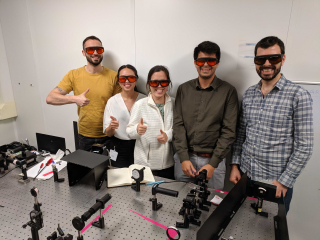
Practical component of the course where we set up a one-photon laser stimulation system
"I went to Paris to participate in a training workshop entitled "Optical control of brain functioning with optogenetics and wave front shaping". The course consisted of lectures given by leading members of the field, who taught many relevant subjects ranging from the basics of optogenetics, the theory behind optical manipulations to shape light, and designing viral vectors. The course also included practical components led by members of the Emiliani lab, where participants were able to try out techniques we learned during lectures. Overall, I gained a greater understanding of optical techniques to study neuroscience and gained hands-on experience for setting up these techniques in the lab. I was also able to network with principal investigators, post-docs, and graduate students around the world, who are using similar techniques in their labs."
Larry Dong
Epidemiology and Biostatistics and Occupational Health
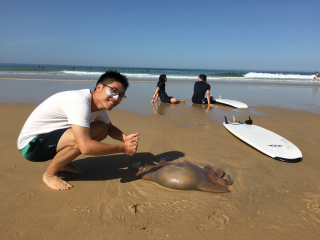
Surfers, Jellyfish and an Unplanned Get Away Weekend to the Beach
"Overall, the experience was great. The people in the program were very nice and the city of Bordeaux is absolutely beautiful. As for my research/thesis, I was able to get acquainted with my supervisor's research team and familiarize myself and I was able to become more familiar with the data that I am handling. Also, my supervisor at the University of Bordeaux, Dr. Rodolphe Thiébaut, shared many intuitions of the clinical implications of my decisions/results, which I felt was very important and can be easily ignored in a project that revolves around statistical methodology.
All in all, I was very happy to have had this opportunity and I truly believe that this experience will serve me well in my future career."
Charles Brunette
Atmospheric and Oceanic Sciences

The Météopole, in Toulouse, regroups several research centres focusing on atmospheric and oceanic sciences.
"My research stay in Europe in the beginning of 2020 was a fruitful and enriching experience. My research stay was also marked by the outbreak of the COVID-19 pandemic, which forced the interruption of the research stay halfway through. Despite its shortened duration, this research stay provided me with many opportunities for exchanging with world-class specialists in climate sciences and remote sensing, and providing me with many new ideas and material for improving my doctoral thesis.
Experiences gained:
Data analysis, presentation skills, writing skills, adaptation to different work environments, insights from the climate modeling research community, insights from the remote sensing of the cryosphere research community."
Germany
Molly Behan
Civil Engineering
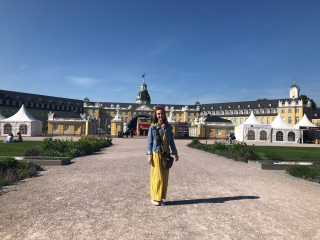
A visit to the Karlsruhe Palace following workshop activities.
"As a participant in the "Hands-On Sustainable Mobility International Workshop 2019", I worked in an interdisciplinary team with students from around the world to propose solutions to reduce the carbon footprint of the host institution, Karlsruhe University of Applied Sciences. The workshop included technical tours of the transportation systems in Karlsruhe, a conference where I presented my research, and countless opportunities for networking and collaboration. At the closing of the workshop each team presented their solutions to all the participants so that we could share knowledge and ideas before returning to our home institutions."
Mika Brown
Biomedical Engineering
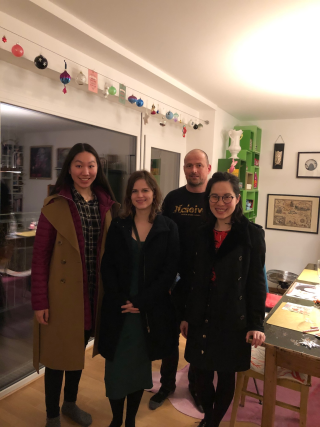
GMA experience in Germany
"My mobility experience predominantly took the form of presentations by Dr. Dollinger's associates and students, lab tours, and discussion periods for potential collaborations. I also gave a presentation on my research. The presentation given by one of Dr. Dollinger's associates on laryngeal mucosa analysis was particularly useful, as the lab has developed a technique that enables much greater accuracy in the analysis of tissue samples than we have previously been able to achieve at McGill... I also learned about the techniques used for mathematically modelling the mechanics of vocal folds, using an in silico model, which has potential implications for the interpretation of data for the mechanical section of my project. In turn, my presentation helped to give some background in the design of biomaterials for vocal fold applications, which the host group found interesting because they have a few projects under development towards the practical application of their mathematical models to biomaterials...
Through the mobility experience, I gained insight into a mathematical approach to vocal fold analysis and contributed some context to biomaterial design in return."
Italy
Varun Surendran
Chemical Engineering
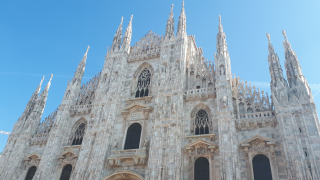
Picture of the Duomo di Milano
"CO2 methanation reaction that has a potential of disrupting the current energy storage scenario. This reaction forms the core of the Power-to-Gas process (P2G) process in which excess electricity is converted to hydrogen (H2) via water electrolysis and subsequently converted with captured/sequestered carbon dioxide (CO2) to methane (CH4). This technology can bridge temporal and geographical gaps issues associated with the renewable sources of energy. The key challenges in the P2G process are related to the later step - the catalytic methanation of H2 and CO2 to CH4. Design of chemical reactors for heterogeneous reactions are challenging due to the coexistence of multiple complex phenomena like reactions, local flow phenomena, interfacial mass transfer, heat transfer, etc. A detailed understanding of the reaction kinetics is one of the primary requirements for designing a stable and efficient reactor. Utilizing an integral reactor like the CPR with axial sampling capabilities provides up to 60 data points per kinetic experiment. This reactor has a movable capillary which enables axial gas species concentration measurement. It is also equipped with an IR camera that provides a 2D map of local temperatures on the catalyst surface. This project was aimed towards developing understanding into the hydrodynamics in the CPR to enable us to extract the intrinsic kinetics for the CO2 methanation reactions. As part of this project a 3D reactive model of the CPR reactor was developed and used to investigate the internal flow phenomena. The simulation results have given insights to optimize the operating conditions for the kinetic experiments and ideas for design improvement for the next generation CPR reactor."
Marko Kudrna Prasek
Earth and Planetary Sciences
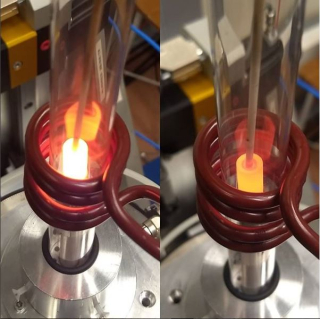
Induction furnace at Elettra Sincrotrone; 1100 and 900 C; same ISO, exposure time and aperture.
"I have completed the installation and commissioning of the induction furnace and oxygen fugacity control system at Elettra synchrotron. This will allow the x-ray tomographic study of rocks and other materials at high temperature in real time at most oxygen fugacity conditions. During this time I have arranged new collaborations and furthered a side project I have been working on during my PhD. I am grateful to be selected for the Graduate Mobility Award selection committee as it would be much more difficult to complete this project without being selected for the award."
Lebanon
Gabriel Larivière
Islamic Studies
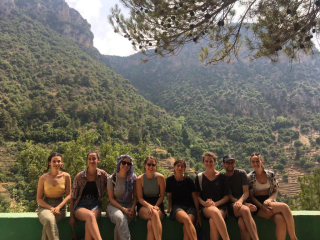
Hiking with other students from the institute in the Qadisha valley
"My research trip consisted of an intensive Arabic program run by the Institut Français au Proche-Orient for an entire month in Beirut. I had 27 hours of advanced Arabic classes in a small group of 5 students, where we practiced our reading, writing, listening, and speaking skills on a wide variety of topics, ranging from politics, social issues, classical and modern Arabic literature, history, contemporary medias, and grammar. All classes were conducted solely in Arabic and we had around 15 hours of homeworks per week. Being in Lebanon also provided me with a unique opportunity to practice these language skills in many everyday contexts.
Since my thesis is based exclusively on religious texts, newspaper articles, letters, declarations, and memoirs of Syrian rebels, all of them written in Arabic, this research trip was invaluable in providing me with advanced skills in Arabic essential to conduct my research."
Norway
Frances Amyot
Geography
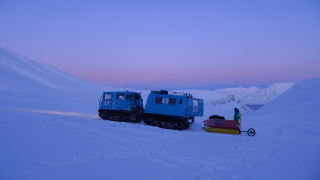
Conducting a Ground Penetrating Radar (GPR) survey on the Longyearbreen glacier
"I travelled to Longyearbyen, a tiny town on a small, high Arctic Archipelago belonging to Norway to take a graduate field course at the University Centre in Svalbard. During my stay, I learned new field techniques and data processing methods that I have since applied to collaborations back at McGill. I was able to meet graduate students in my field of study from around the world, and enjoy the Polar night in a valley surrounded by beautiful mountains."
Spain
Elisa Guma
Integrated Program in Neuroscience
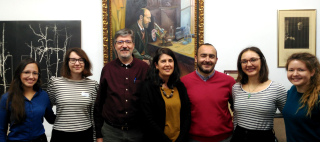
Group photo with the organizers of the course, and the other FENS tavel award recipients at the Cajal Institute, Madrid, Spain.
"Thanks to support from both the McGill Graduate Mobility Award and the FENS and IBRO-PERC stipend, I was able to attend a two-week neurodevelopmental biology course in Madrid, Spain, hosted by both the Cajal Insititute and the Universidad Autonoma de Madrid.
The focus of my thesis is to understand how exposure to maternal immune activation in the womb affects offspring brain development, as it is a known risk factor for neurodevelopmental and neuropsychiatric disorders. The opportunity to attend the neurodevelopmental biology course allowed me to acquire in depth knowledge about embryology and early brain development, which were integral to advancing my research. In addition to the course work, I had a chance to work closely with some professors and students at the Cajal institute and learn about experimental techniques I could apply to my own research back at McGill. This led to a collaboration between my current laboratory at McGill university. Finally, at the Cajal Institute, I had the invaluable opportunity to learn more about the life and work of Santiago Ramon y Cajal, while viewing his original drawings and microscope slides."
Switzerland
Shreya Saha
Physics
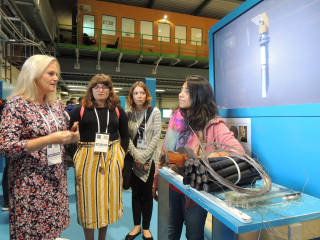
Me guiding a student group at the SM18 facility, CERN
"I am a 3rd Year PhD student in Experimental High Energy Physics and I spent one year at The European Centre for Nuclear Research (CERN) as part of my research project. I have contributed to the McGill ATLAS group and the ATLAS Collaboration but taking up activities, such as maintenance of the detector by monitoring data-taking from particle collisions, in the Control Room. I have also contributed by helping in build a new trigger for a new physics analysis (trigger is filter which helps in selecting the most interesting events out of the 40 million collisions which happen every second).
Apart from the skills I gained in the above projects, I also attended workshops at CERN and did outreach. I have become a trained guide for 13 visitor points at CERN and the underground ATLAS cavern, which houses the massive detector. I have completed around 40 guided tours and some private tours as well."
United Kingdom
Farzaneh Barak
Human Nutrition
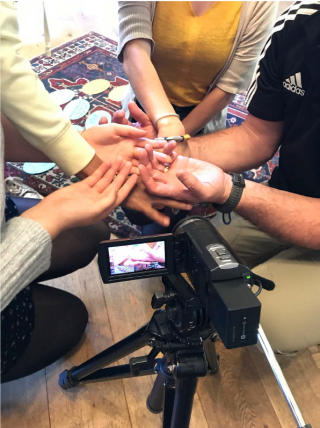
Exploring international networks and ways of working with Insightshare's participatory video workshop in Oxford
"I participated in a one-week intensive course of "Participatory Video Facilitation" at InsihtShare organization, Oxford, UK. Taking this course gave me the opportunity to learn the required skills to carry out my own participatory video project in Uganda which will be in Winter/Summer 2020. Without taking this practical course, I wasn't confident and capable enough to do it independently in the field, thanks to the GMA award to provide this opportunity for me."
Stephania Palimeris
SPOT

This is a photo of me in front of the Welsh Dragon. I won the McGillAbroad Selfie Contest with this photo.
"I travelled to Cardiff, Wales in April to attend the "TMS Workshop for Cognitive Neuroscience". The aim of this workshop was to equip up-and-coming neuroscientists and researchers with knowledge about the opportunities and limitations Transcranial Magnetic Stimulation (TMS) can offer in neuroscience research. The workshop was done in collaboration with neuroscientists from University College of London, University of Lancaster, and University of York in the United Kingdom, who provided a comprehensive overview of TMS methods and experimental design. This workshop consisted of a 3-day intensive training, from which I obtained hands-on experience using a TMS system as both an experimenter and as a participant, designed my own experiment from the ground up, and deconstructed the strengths and weaknesses of my ongoing research project. Thus, this training course was directly related to my field of research as I use TMS to investigate corticospinal integrity in stroke individuals, using motor evoked potentials (MEPs)."
Rose Chabot
Political Science
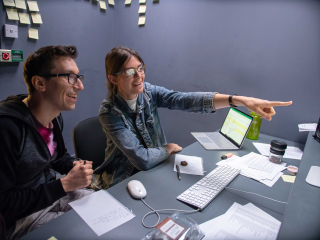
Filmmaking for Fieldwork edition 2019 Ethnographic Film editing workshop
"During my research stay in Manchester, UK, I had the opportunity to participate to a eleven-day summer school on documentary ethnography, a qualitative interpretivist method employed in social sciences such as anthropology, sociology, and political science. The summer school allowed me to learn how methodological and theoretical approaches are applied in practice. The school was focused mostly on developing doctoral students' practical skills related to camera and sound recording, as well as editing. This experience would not have been possible without the financial support provided by the Graduate Mobility Award; I am very grateful for it."
Elia Foster
Music Performance
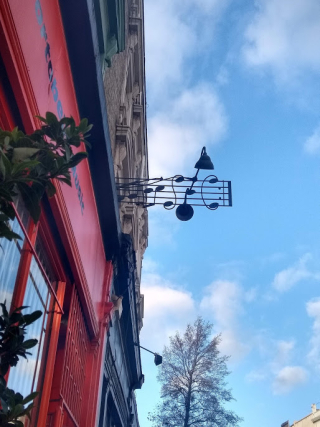
Musicality in London!
"Studying in the United Kingdom was illuminating! My duo partner and I went into this experience with the hopes of gaining a better understanding of how to effectively work together and collaborate with others in order to raise awareness of all the possibilities available in composing for flute and clarinet. Our expectations were more than surpassed as we shadowed organizers of the London Contemporary Music Festival and took lessons with freelancers in London. During our time in London we were able to interview artists about the process of commissioning new works and organizing smaller scale concerts. We received great advice and have a plan to begin commissioning and performing flute and clarinet works."
Luke Anderson-Trocmé
Human Genetics
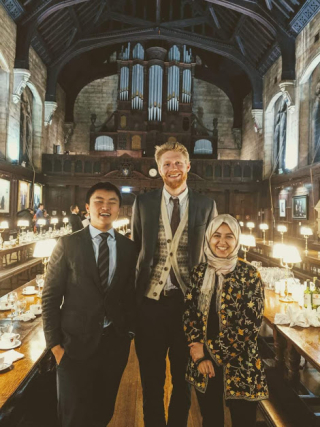
Formal dinner at Balliol College with two students from Gil McVean's Lab.
"I attended all the lab meetings during my stay in Oxford. I presented my work to the lab on October 14th and received excellent feedback, questions, criticisms and suggestions for future directions.On a daily basis I was meeting with the other students and post-graduates from Gil’s lab as well as students and professionals from other labs in the Big Data Institute... I attended a number of networking events at the BDI as well as an event at the Rhodes House. I also went to Nantes University for a 3 day visit to present my work as well as collaborate on existing projects with the French University. [Finally,] I completed a draft of my manuscript and am finalizing the main results."
Jocelyn Whitehead
Integrated Program in Neuroscience
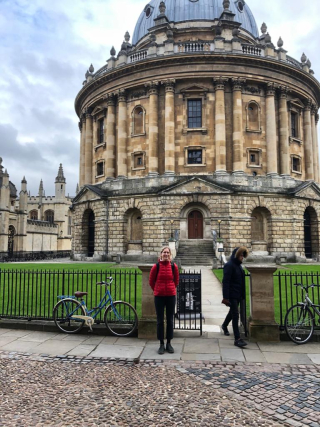
The Radcliffe Camera at Oxford University
"At the Oxford Centre for Anxiety Disorders and Trauma, I gained invaluable clinical experience conducting diagnostic assessments of student paramedics, as part of a large PREVENT-PTSD clinical trial. Additionally, I applied advanced statistical methods to analyze mental health resiliency in at-risk first responders (police, fire, ambulance, search and rescue). The opportunity added depth and context to my PhD research, Investigating the Neural Correlates of Fear, encouraging a liberal translation of skills and knowledge across the two disciplines. The Graduate Mobility Award provided a way for me to gain proficiencies in clinical research, whilst working among international leaders in anxiety disorder research. Through comparison, my second experience with the Graduate Mobility Award has offered me a drastically different asset towards my research career, albeit, comparatively enriching as the first."
United States
Andrea Sanchez Aguilar
Experimental Surgery

Yale University
"The Graduate Mobility Award, allowed me to undertake a Postgraduate Research Fellowship at Yale University for four months in parallel with my master studies @McGill!
At Yale, I collaborated with cardiac surgeons and engineers in the development of emerging cardiovascular technologies for the treatment of several heart diseases. More specifically, I conducted in-vitro feasibility studies in a pulsatile circulatory loop that simulates the heart activity to assess the efficiency of the devices and to propose different configurations aiming to meet the physiological needs of a patient.
I had an absolutely amazing stay in the US, learned a lot, worked many extra hours, but would never regret the experience and the new connections/people I came across.
Once again thank you McGill and GPS for making this experience possible!"
Hossein Ravanbakhsh Habibabadi
Mechanical Engineering
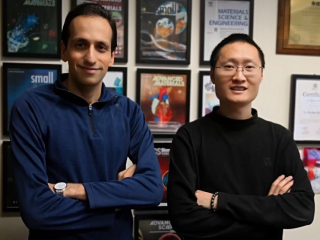
Last day of the research internship at Harvard Medical School. Hossein Ravanbakhsh (left) and Dr. Shrike Zhang (right)
"I had the opportunity to participate in a research internship at BWH, Harvard Medical School. Working in Dr. Shrike Zhang's lab, which is a pioneering lab in the field of 3D bioprinting was a valuable experience for me. Except for the top-notch facilities, I could benefit from the innovative ideas of Dr. Zhang. Also, I could establish a number of connections with the academic network of Boston during my 6-months stay. I highly recommend Ph.D. students to undertake a research internship during their Ph.D. studies as it would help them to boost their experience in their field of study."
Sikandar Sajid
Civil Engineering
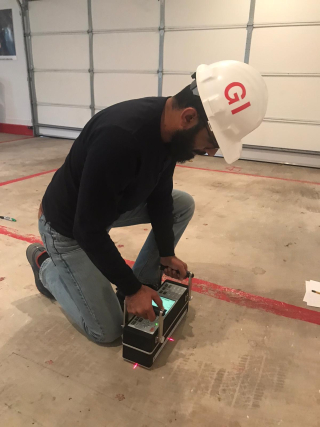
Performing Ultrasonic Shear wave tomography test on a specimen in Germann's Instruments, Evanston, Illinois, USA
"I met with researchers working in the field of stress wave propagation for condition assessment application and had their opinion on my research project. The experiments performed gave me valuable insights on how to use the equipment and the necessary steps needed for the success of the testing. Besides, the results of the tests were needed to confirm our numerical simulations."






























 This work is licensed under a
This work is licensed under a